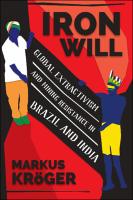Iron WIll
Global Extractivism and Mining Resistance in Brazil and India
| dc.contributor.author | Kröger, Markus | |
| dc.date.accessioned | 2021-04-02T12:34:10Z | |
| dc.date.available | 2021-04-02T12:34:10Z | |
| dc.date.issued | 2021 | |
| dc.identifier | OCN: 1159983121 | |
| dc.identifier.uri | https://library.oapen.org/handle/20.500.12657/47589 | |
| dc.description.abstract | "Iron Will lays bare the role of extractivist policies and efforts to resist these policies through a deep ethnographic exploration of globally important iron ore mining in Brazil and India. Markus Kröger addresses resistance strategies to extractivism and tracks their success, or lack thereof, through a comparison of peaceful and armed resource conflicts, explaining how different means of resistance arise. Using the distinctly different contexts and political systems of Brazil and India highlights the importance of local context for resistance. For example, if there is an armed conflict at a planned mining site, how does this influence the possibility to use peaceful resistance strategies? To answer such questions, Kröger assesses the inter-relations of contentious, electoral, institutional, judicial, and private politics that surround conflicts and interactions, offering a new theoretical framework of “investment politics” that can be applied generally by scholars and students of social movements, environmental studies, and political economy, and even more broadly in Social Scientific and Environmental Policy research. By drawing on a detailed field research and other sources, this book explains precisely which resistance strategies are able to influence both political and economic outcomes. Kröger expands the focus of traditionally Latin American extractivism research to other contexts such as India and the growing extractivist movement in the Global North. In addition, as the book is a multi-sited political ethnography, it will appeal to sociologists, political scientists, anthropologists, geographers, and others using field research among other methods to understand globalization and global political interactions. It is the most comprehensive book on the political economy and ecology of iron ore and steel. This is astonishing, given the fact that iron ore is the second-most important commodity in the world after oil." | en_US |
| dc.language | English | en_US |
| dc.subject.classification | thema EDItEUR::J Society and Social Sciences::JP Politics and government | en_US |
| dc.subject.classification | thema EDItEUR::K Economics, Finance, Business and Management::KC Economics::KCL International economics | en_US |
| dc.subject.other | Iron ore mining | en_US |
| dc.subject.other | Brazil | en_US |
| dc.subject.other | India | en_US |
| dc.title | Iron WIll | en_US |
| dc.title.alternative | Global Extractivism and Mining Resistance in Brazil and India | en_US |
| dc.type | book | |
| oapen.identifier.doi | 10.3998/mpub.11533186 | en_US |
| oapen.relation.isPublishedBy | e07ce9b5-7a46-4096-8f0c-bc1920e3d889 | en_US |
| oapen.relation.isbn | 9780472132126 | en_US |
| oapen.pages | 317 | en_US |
| peerreview.anonymity | Double-anonymised | |
| peerreview.id | d98bf225-990a-4ac4-acf4-fd7bf0dfb00c | |
| peerreview.open.review | No | |
| peerreview.publish.responsibility | Scientific or Editorial Board | |
| peerreview.review.decision | Yes | |
| peerreview.review.stage | Pre-publication | |
| peerreview.review.type | Full text | |
| peerreview.reviewer.type | External peer reviewer | |
| oapen.review.comments | The proposal was selected by the acquisitions editor who invited a full manuscript. The full manuscript was reviewed by two external readers using a double-blind process. Based on the acquisitions editor recommendation, the external reviews, and their own analysis, the Executive Committee (Editorial Board) of U-M Press approved the project for publication. |

